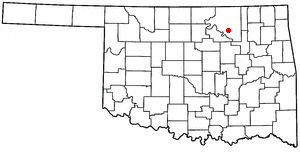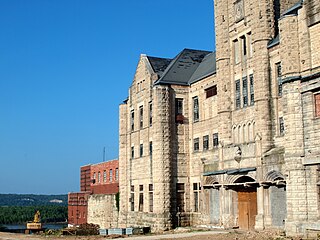
Hominy is a city in Osage County, Oklahoma, United States. The population was 3,565 at the 2010 census, a 38 percent increase over the figure of 2,584 recorded in 2000.

The Mississippi Department of Corrections (MDOC) is a state agency of Mississippi that operates prisons. It has its headquarters in Jackson. As of 2020 Burl Cain is the commissioner.

The Washington State Department of Corrections (WADOC) is a department of the government of the State of Washington. WADOC is responsible for administering adult corrections programs operated by the state. This includes state correctional institutions and programs for people supervised in the community. Its headquarters are in Tumwater, Washington.

A super-maximum security (supermax) or administrative maximum (ADX) prison is a "control-unit" prison, or a unit within prisons, which represents the most secure level of custody in the prison systems of certain countries.

The Oklahoma State Penitentiary, nicknamed "Big Mac", is a prison of the Oklahoma Department of Corrections located in McAlester, Oklahoma, on 1,556 acres (6.30 km2). Opened in 1908 with 50 inmates in makeshift facilities, today the prison holds more than 750 male offenders, the vast majority of which are maximum-security inmates. They also hold many death row prisoners.

Nathan Burl Cain is the commissioner of the Mississippi Department of Corrections and the former warden at the Louisiana State Penitentiary at Angola in West Feliciana Parish, north of Baton Rouge, Louisiana. He worked there for twenty-one years, from January 1995 until his resignation in 2016.
The Mabel Bassett Correctional Center (MBCC) is an Oklahoma Department of Corrections prison for women located in unincorporated Pottawatomie County, Oklahoma, near McLoud. The facility houses 1241 inmates, most of whom are held at medium security. It is the largest female prison in Oklahoma.

The Oklahoma Department of Corrections is an agency of the state of Oklahoma. DOC is responsible for the administration of the state prison system. It has its headquarters in Oklahoma City, across the street from the headquarters of the Oklahoma Department of Public Safety. The Board of Corrections are appointees: five members are appointed by the Governor; two members are appointed by the President Pro Tempore of the Senate; and two members are appointed by the Speaker of the house of Representatives. The board is responsible for setting the policies of the Department, approving the annual budget request, and working with the Director of Corrections on material matters of the agency. T. Hastings Siegfried is the current chairman of the board. The director, who serves at the pleasure of the governor, is the chief executive of the department. The current director of Corrections is Scott Crow, who was appointed after Director Joe Allbaugh resigned his post on June 13, 2019. Crow was confirmed by the Oklahoma State Senate as director in May 2020.

The Prison For Women, located in Kingston, Ontario, was a Correctional Service of Canada prison for women that functioned at a maximum security level from 1934 to 2000.

The Wisconsin Department of Corrections (WIDOC) is an administrative department in the executive branch of the state of Wisconsin responsible for corrections in Wisconsin, including state prisons and community supervision. The secretary is a cabinet member appointed by the governor of Wisconsin and confirmed by the Wisconsin Senate.

The Florida Department of Corrections (FDC) is the government agency responsible for operating state prisons in the U.S. state of Florida. It has its headquarters in the state capital of Tallahassee.

The Alabama Department of Corrections (ADOC) is the agency responsible for incarceration of convicted felons in the state of Alabama in the United States. It is headquartered in the Alabama Criminal Justice Center in Montgomery.

The Missouri State Penitentiary was a prison in Jefferson City, Missouri, that operated from 1836 to 2004. Part of the Missouri Department of Corrections, it served as the state of Missouri's primary maximum security institution. Before it closed, it was the oldest operating penal facility west of the Mississippi River. It was replaced by the Jefferson City Correctional Center, which opened on September 15, 2004. The penitentiary is now a tourist attraction, and guided tours are offered.
The Central Mississippi Correctional Facility (CMCF) is a Mississippi Department of Corrections (MDOC) prison for men and women located in an unincorporated area in Rankin County, Mississippi, United States, between the cities of Pearl and Brandon. The 171-acre (69 ha) prison was, for a period of time, the only state prison to hold female prisoners in Mississippi, in addition to minimum and medium security male offenders. It operates as the female death row of the state.
Mack H. Alford Correctional Center is an Oklahoma Department of Corrections prison in unincorporated Atoka County, Oklahoma, near Stringtown. The medium security prison, which opened in 1973, is named after Mack H. Alford, who once served as the prison's warden.
North Fork Correctional Center is a medium to maximum security correctional facility for men located east of Sayre, Beckham County, Oklahoma.
James Crabtree Correctional Center is an Oklahoma Department of Corrections state prison for men located in Helena, Alfalfa County, Oklahoma, with a capacity of 800 medium-security inmates and 200 minimum-security inmates. The grounds were first established in 1904 before Oklahoma statehood, serving as the Cornell Agriculture College, an orphanage, and the Helena State School for Boys. The property was reassigned to the Department of Corrections on May 24, 1982.
Joseph Harp Correctional Center (JHCC) is an Oklahoma Department of Corrections state prison for male inmates located in Lexington, Cleveland County, Oklahoma. The medium-security facility opened in September 1978.
The Federal Correctional Institution, Hazelton is a medium-security United States federal prison for male inmates, as well as a secure facility for female inmates, located in unincorporated Preston County, West Virginia. It is the newest facility in the federal prison system and is operated by the Federal Bureau of Prisons, a division of the United States Department of Justice. The New York Times notes that its nickname is "Misery Mountain".
Incarceration in Oklahoma is how inmates are rehabilitated and reformed. Incarceration in Oklahoma includes state prisons and county and city jails. Oklahoma has the second highest state incarceration rate in the United States. Oklahoma is the second in women's incarceration in the United States. After becoming a state in 1907, the first prisons were opened and reform began.











